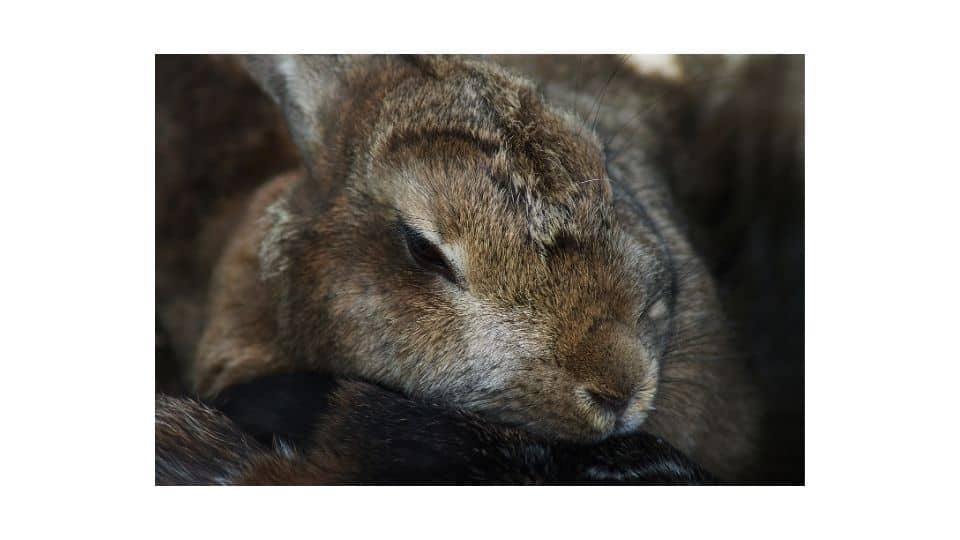Bunnies are nocturnal creatures, meaning they sleep during the day when it’s bright outside. They’re active at night and spend their days eating, drinking water, and hiding from predators in dark places. They have a well-developed system of whiskers called vibrissae that allows them to find prey in the dark.
In the wild, rabbits usually live in burrows with at least one exit hole so they can escape a predator if need be. When rearing young rabbits or during tough times (like winter), bunnies will hibernate to conserve energy and body heat by becoming dormant for months at a time.
How long do rabbits sleep at night?
Rabbits tend to sleep for about 6-10 hours at night and take cat-naps during the day when it’s brightened out.
Rabbits domesticated as pets usually sleep for nine to 10 hours per night. Some breeds, such as dwarf rabbits, can be active for nearly 24 hours a day. Rabbits that are kept in outdoor hutches or that live in very warm climates may not have any sort of regular sleeping patterns.
When do rabbits sleep?
In the wild, rabbits spend their days eating, drinking water, and hiding from predators in dark places. They’re nocturnal, meaning they’re active at night and sleep during the day when it’s bright outside.
Do rabbits need a bed to sleep in?
Domestic rabbits usually sleep in some sort of bunny-proofed, confined area for safety. In nature, rabbits most often sleep in burrows and use their sharp sense of hearing to listen for predators.
While you might not have a burrow set up in your home, they’ll enjoy sleeping in a cozy pet bed. Your bunny will be safe and sound and enjoy the comfort of something familiar whenever you’re away from home.
Many rabbits tolerate sleeping in a cage or hutch at night, but they are definitely happier if allowed to roam freely around the house during the day. If this is not possible, then ensure their cage is kept in a warm and cozy room with plenty of toys and a soft area to sleep on.
Can I give my rabbit a blanket?
It might seem like a good idea to give your rabbit a blanket or towel to sleep on or under, but this is actually dangerous for rabbits.
A rabbit can easily chew through these items and ingest them, which can cause indigestion (from ingesting fibers) and internal blockages (from stuffing) if the item is swallowed. Plus, blankets and towels are not comfortable for bunnies to sleep on since their sensitive feet cannot grip them easily.
Can I sleep with my rabbit?
Due to their lack of a need for sleep, rabbits that are left on their own will be active all day, or most of the day. You may not want him waking you up at 2 am so you can play, and your rabbit may not enjoy being confined to his cage while you sleep. Rabbits are known to chew on objects and sometimes even people (especially if they don’t get enough exercise) so it is better for both the human and the rabbit if they have different sleeping areas.
Can rabbits sleep with lights on?
You may look at that as a bit of a no-brainer, but thanks to the response we received to this question from our readers, it is quite clear that many people are confused about whether rabbits should sleep in total darkness.
It would appear that this belief was spread by the “experts” who once wrote about rabbits and their care, which unfortunately led to many people believing that their pet rabbit needs to have complete darkness in order to be able to relax and go into a state of hibernation.
Rabbit sleeping positions
Rabbits have the unique ability to sleep in an upright position. As they move around, their muscles and joints are prepared for any quick movements so that no time is wasted while they are sleeping.
This is possible due to their flexibility. They can also curl up on their side when sleeping or when taking a break from running around.
However, rabbits do not sleep in a fetal position as humans do but lie on their side with legs extended outward. Of course, this could change as they get older which might make it more difficult for them to sleep comfortably in their original position.
Meet Madison Phillips, your compassionate guide to pet well-being. With experience from VCA Animal Hospitals and Laxton Vet Clinics Bellaire Inc. Madison honed her skills and embraced the balance of medical expertise and compassion, through her articles, she simplifies pet care, whether you’re a newbie or an experienced pet parent.

